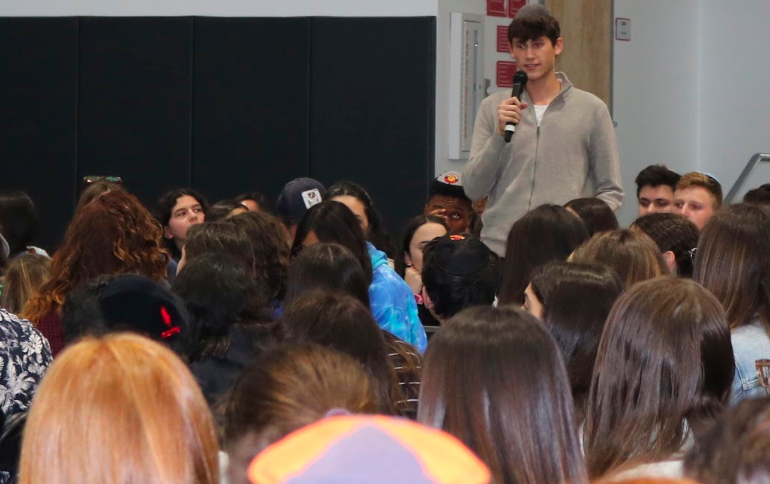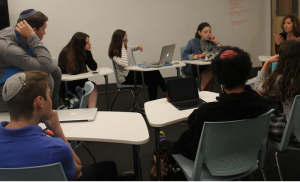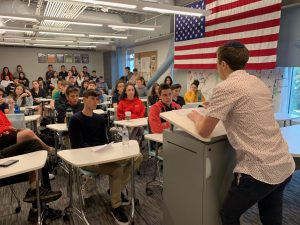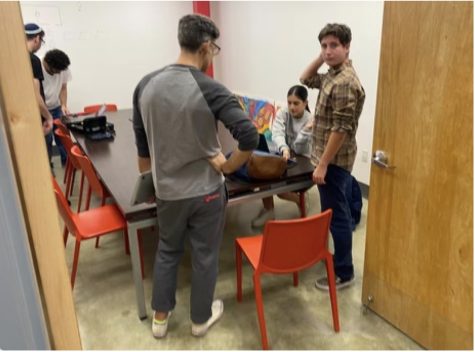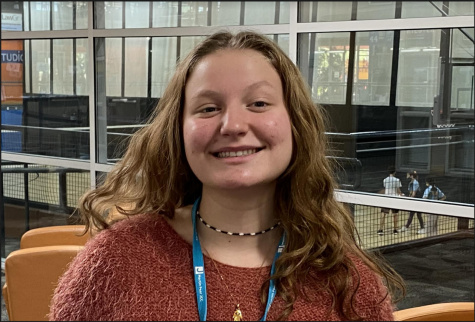Town Hall vote puts Fairness Committee in charge of Just Community elections
FAIR: Senior Joseph Klores, one of three co-chairs of the Fairness Committee this year, told Tuesday’s Town Hall why his committee should help oversee Just Community elections.
After years of dilemmas, complications and mistakes in the running of elections, the Shalhevet community voted this week to appoint the Fairness Committee to be in charge of elections rather than Agenda, which had overseen them since the founding of the school.
In a two-part vote taken online during Town Hall on Tuesday, 78.7 percent of the Just Community voted “yay” for changing the way elections are currently run.
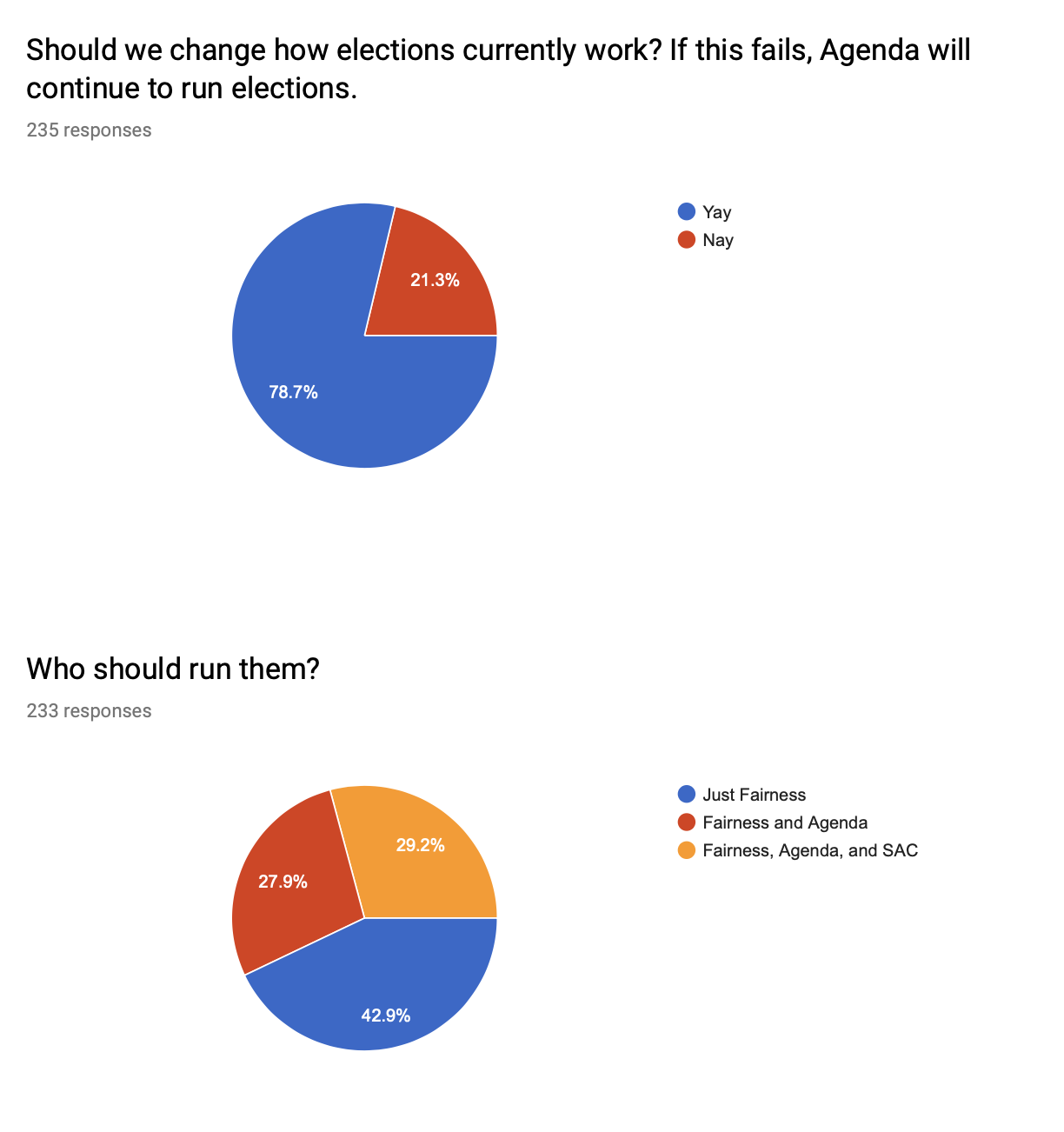
As for who should oversee the process going forward, 42.9 percent said it should be the Fairness Committee alone. Another 29.2 percent said it should be run jointly by the Fairness, Agenda and Student Activities committees, while 27.9 percent voted for a combination of Fairness and Agenda.
That means the Fairness Committee will now run all elections except those involving proposals. Agenda will continue to oversee proposal votes, the winning proposal stated.
Current Fairness co-chair Evan Rubel said a new voting structure would build on the old, and would be ready in time for grade-level representative elections this fall.
“Going forward, we have to take all the infrastructure that previous Agenda chairs have put into place and really streamline it, make it more effective,” said Evan after the vote.
“That will ensure that the upcoming rep elections and future officer elections will go smoothly for Fairness oversight.”
The vote and a discussion beforehand were a followup from the previous week’s Town Hall, when a proposal was submitted by the chairs of Fairness and Agenda for their two committees to oversee elections together.
Student reaction and an amendment proposal from the Student Activities Committee (SAC) led to competing choices for this week’s vote: to have elections run only by Fairness chairs, or to have the chairs of Agenda, Fairness and SAC responsible together.
During the Town Hall discussion, while making a case for each proposal, Agenda Chair David Edwards said having three committees run voting could be confusing, while some SAC leaders said their committee should be included because it, too, had its leaders chosen by community vote.
The final vote wasn’t close, as the Fairness-only decision was chosen by almost twice as many students as either other option.
“Fairness should have been running elections this whole time,” said junior Mimi Czuker, who voted for the proposal that won. “It’s called the Fairness Committee because their job is to ensure that everything the school does is just and what we want it to be. I don’t think that has anything to do with Agenda.”
This year’s change was spurred by a mistake last May, when the result of an election for two Fairness co-chairs was overturned after votes for the two slots were counted as first- and second-place votes for the same office. This resulted in the computer program that tallied the votes failing to consider some students’ votes for first place and other voters’ votes for second place.
Members of last year’s Fairness Committee decided that voting system, which had been run by Agenda as usual, was unfair. It overturned the election and allowed the three top-scoring candidates to become three co-chairs for this year.
It was not the first time there were concerns regarding student elections in the Just Community.
In 2017, Agenda leaders promised to hold a constitutional convention partly to rewrite election rules, after several issues, including leaders of the Fairness Committee picking the winners of the race for senior Fairness representatives instead of letting the senior class vote.
In 2016, a rising junior was allowed to run for Agenda Chair even though the constitution said it should be a senior. A senior who asked to challenge the decision in a Fairness case was told it was too close to the end of the year.
In the spring of 2015, a candidate who lost by three votes challenged an election result because the sister of the winning candidate had been asked by administration to gather votes by phone from seven students who hadn’t voted, possibly influencing their votes. And that summer, an administrator appointed a committee of students to draft new election rules without Just Community input.
In 2010, there were many errors in the election such as one candidate winning a spot on two committees, students administering ballots of a proposal they themselves had introduced, and more ballots being submitted per grade than students in that grade.
And in 2007, according to Boiling Point print archives, an election was invalidated when it was discovered that one candidate had made extra ballots and stuffed them into the Agenda ballot box when no one was looking.
There have also been controversies over political parties, whether to publish actual vote counts and who should oversee the balloting.
Each time, candidates for Agenda Chair then promised to fix the system the next year, but moved on to other matters once school began.
More than a decade later, this week a major change was made.
The original proposal referenced what it called “Chairgate,” referring to last May’s disputed election for Fairness chair. All of the proposals can be found on the Just Community website.
“In light of recent events (i.e., Chairgate), it has become evident that an explicit framework should be established for the administration, design, and execution of Just Community elections,” the proposal stated.
“We feel that the Agenda Committee—which has historically overseen Just Community elections—should henceforth split its responsibilities with the Fairness Committee, given that the Fairness Committee is to uphold every member of the Just Community’s ‘Right to Fairness.’”
According to David, after this proposal was introduced at Town Hall Sept. 3, leaders of SAC sent Agenda a new proposal, in which they explained why they felt they should be included in overseeing elections.
The SAC proposal stated:
“SAC (Student Activities Committee) strongly opposes the new proposal regarding Agenda and Fairness overseeing elections. We believe that if both Agenda and Fairness committees oversee the elections then SAC should be involved as well. SAC is a Committee that requires electing officials, Chairs, representative, etc. Thus, we believe that SAC should help oversee that our candidates are fairly elected, along with other candidates for other committees.”
However, SAC leaders actually supported the idea of all-Fairness election oversight, and agreed with the results of the vote. According to Gabby Lasry and Ari Shlacht, two of the three SAC co-chairs, they only made the proposal because they thought if the two other Just Community committees were involved, they should be too.
“Once we added ourselves to the proposal, David Edwards and the Agenda Committee came up with a third option of just Fairness,” said Ari in an interview. “We were completely pro that idea as well. The way they framed it in Town Hall didn’t make it seem like that — it was kinda a misconception for all of the student body — but we are completely happy with the way it turned out.”
Before opening up this week’s Town Hall for student input, David said that neither the Constitution or the Student Handbook of Shalhevet discuss who should run elections. Agenda’s running them was merely tradition.
He then explained the rationale for each choice that would appear on the voting ballot.
For the proposal to combine Agenda and Fairness, the reasoning is that last year the election system was flawed, and there should be more oversight.
For the case for all three committees ruling together, David said that SAC leaders believed if the two other Just Community sectors were involved, they should be too. Elections affect SAC just as much as the other two committees, and SAC is “equally involved in the JC as Agenda and Fairness.”
David then made the case for the amendment to make Fairness the only overseeing body in elections, which eventually won.
“Adding multiple committees could make things confusing,” David said.
“Agenda has always done it, but Agenda has tons of responsibilities throughout the whole year. Fairness has more of a case-by-case basis. Maybe they have some room to take on more responsibility in the school.”
Get the latest from The Boiling Point. Sign up for our news feed.
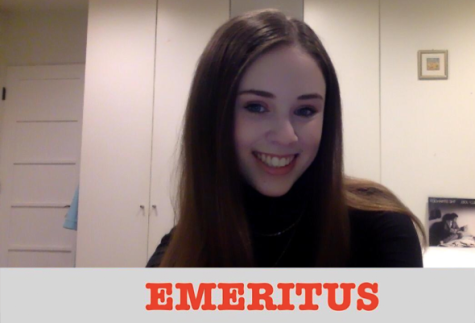
Molly is studying at Midreshet Torah v'Avodah seminary in Jerusalem and will attend Columbia University in New York next year.

